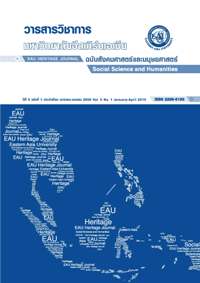The Marketing Strategy of Non-Profit Organization for Meditation Center in the United States of America and the United Kingdom
Keywords:
meditation center, marketing strategy, non-profit making organization, กลยุทธ์การตลาด, องค์กรไม่แสวงผลกำไร, ศูนย์ฝึกสมาธิAbstract
The objective of this research was to study the marketing strategy of a non-profit organization for a meditation center in the United States of America and the United Kingdom. The research employed in-depth interviews on executives and instructors of meditation centers as well as focus groups of people interested in meditation in order to design the questionnaire. The survey research was conducted on 435 British and 435 American nationals as well as respondents interested in meditation using quota sampling with a self-administrative questionnaire. The data obtained was analyzed by descriptive statistical methods and Inferential statistics such as T-test and Path Analysis. The results showed that the target group were male aged 20-30 years old. They liked reading and writing and had positive attitudes towards meditation. Their objectives were relaxation and inner peace. In comparing two target groups in the U.K. and the U.S.A., there had been differences in decision making when choosing centres. In addition, most of the hypotheses were retained and some were rejected. The marketing strategy that the target group considered important to the meditation centres consisted of a peaceful atmosphere and easy access. It should also offer genuine service with professionalism with marketing through word of mouth. Important factors considered in choosing the mediation centres were: process of teaching meditation, service offered by meditation center, qualifications of personnel, physical evidence and place.
กลยุทธ์การตลาดขององค์กรไม่แสวงผลกำไรสำหรับศูนย์ฝึกสมาธิในประเทศสหรัฐอเมริกาและสหราชอาณาจักร
วัตถุประสงค์ของการวิจัยคือ ศึกษากลยุทธ์การตลาดขององค์กรไม่แสวงผลกำไรสำหรับศูนย์ฝึกสมาธิ ในประเทศสหรัฐอเมริกาและสหราชอาณาจักร โดยใช้การสัมภาษณ์ผู้บริหารศูนย์ฝึกสมาธิ ผู้สอนสมาธิ และวิจัย กลุ่มย่อยผู้สนใจฝึกสมาธิที่เป็นชาวสหรัฐอเมริกาและชาวสหราชอาณาจักร เพื่อนำมาใช้ในการออกแบบสอบถาม สำรวจผู้สนใจฝึกสมาธิในประเทศสหรัฐอเมริกาจำนวน 435 คน และประเทศสหราชอาณาจักร 435 คน รวมเป็น870 คนวิเคราะห์ข้อมูล โดยใช้สถิติพรรณนา และใช้สถิติเชิงอนุมาน ได้แก่ t-Test และการวิเคราะห์เส้นทาง (Path Analysis) เพื่อทดสอบสมมติฐาน ผลการวิจัย พบว่า ปัจจัยส่วนบุคคลและคุณลักษณะของผู้สนใจฝึกสมาธิ ส่วนใหญ่ เป็นเพศชาย อายุประมาณ 20-30 ปี ระดับการศึกษาปริญญาตรี ฐานะปานกลางขึ้นไป อาชีพเป็นพนักงานในองค์กร ธุรกิจ มีพฤติกรรมในการดำรงชีวิตที่ชอบอ่านหนังสือ มีบุคลิกเป็นผู้รักอิสระ มีแรงจูงใจในการฝึกสมาธิเพื่อต้องการ ผ่อนคลาย และความสงบทางจิตใจ และมีประสบการณ์การฝึกสมาธิมาบ้าง ผลการเปรียบเทียบระหว่างผู้สนใจ ฝึกสมาธิของทั้งสองประเทศมีความแตกต่างกันในเรื่องการให้ความสำคัญกับกลยุทธ์การตลาดของศูนย์ฝึกสมาธิ เช่นเดียวกันกับการตัดสินใจเลือกศูนย์ฝึกสมาธิ ผลการทดสอบสมมติฐาน พบว่า ปัจจัยส่วนบุคคล การให้ความสำคัญ กับกลยุทธ์การตลาด และการตัดสินใจเลือกศูนย์ฝึกสมาธิมีความสัมพันธ์กัน ศูนย์ฝึกสมาธิที่ผู้สนใจฝึกสมาธิมีความ ต้องการคือ ศูนย์ฝึกสมาธิที่สงบ ร่มรื่น พร้อมการบริการที่ยิ้มแย้มแจ่มใส โดยมีค่าใช้จ่ายในการฝึกที่คุ้มค่า สามารถ เดินทางไปที่ศูนย์ได้สะดวก การส่งเสริมการตลาดที่ดีที่สุดคือ การบอกต่อ และต้องการฝึกสมาธิกับผู้สอนสมาธิ ที่มีประสบการณ์ มีความเชี่ยวชาญ โดยมีขั้นตอนวิธีการฝึกสอนสมาธิที่ง่าย และน่าติดตามต้องการศูนย์ฝึก สมาธิเพื่อสุขภาพ แทนที่จะเป็นศูนย์ฝึกสมาธิอย่างเดียว ความสำคัญของปัจจัยที่มีผลต่อการตัดสินใจเลือก ศูนย์ฝึกสมาธิ คือ ขั้นตอนวิธีการฝึกสอนสมาธิ การบริการของศูนย์ฝึกสมาธิ คุณสมบัติของบุคลากรของศูนย์ ฝึกสมาธิ





